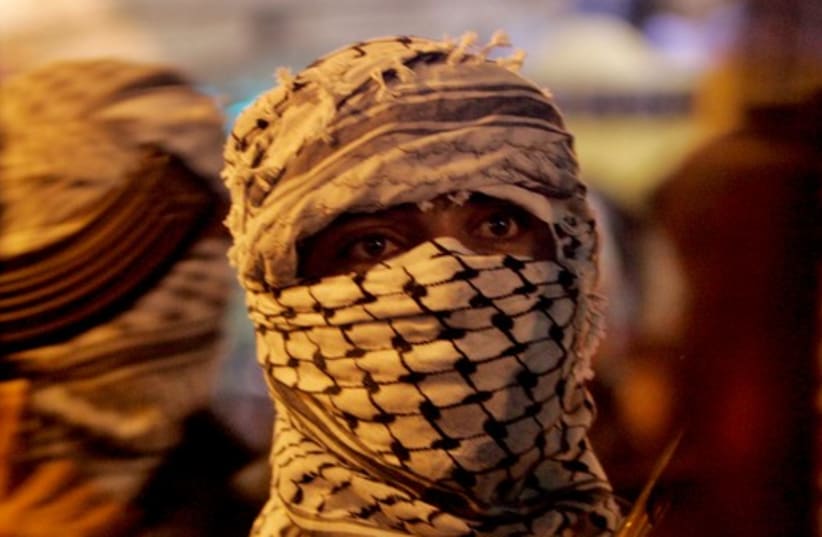Numerous analysts are trying to explain the timing of Hamas’s missile launch this week at a town north of Tel Aviv 85 km. inside Israel. While it seems clear the missile was directed at Israelis, Hamas’s real target was Fatah, the ruling PA political party of Mahmoud Abbas.
Since the end of the Palestinian civil war in 2007, when Hamas took control of the Gaza Strip, Fatah and Hamas have been sparring in an ongoing internal war for the hearts and minds of Palestinians. There are many periods when PA media produce more hate incitement against Hamas, and vice versa, than against Israel. Now is one of those times.
In recent weeks, the enmity and mutual incitement between Fatah and Hamas has increased, as many demonstrators are taking to the streets in the Gaza Strip to protest Hamas’s failed administration of Gaza. Hamas has responded by blaming the demonstrations on Fatah and arresting Fatah activists.
Two weeks ago, when Hamas fired missiles toward Tel Aviv, Fatah spokesman Osama Al-Qawasmi attributed those launches as an attempt to distract Gazans from their misery of failed Hamas rule: “Launching missiles in order to put down the uprising of the starving is an unacceptable act, and is overt and obvious to all” (Official PA daily Al-Hayat Al-Jadida, March 16, 2019).
The attacks on Hamas by PA-Fatah were intensified on official PA TV and on Fatah’s Facebook page, both of which presented pictures of injured Palestinian children who they claimed were beaten by Hamas.
A regular columnist in the official PA daily referred to Hamas as “the face of treason... the supporters of Satan.” He called for the residents of Gaza Strip to rise up violently against Hamas: “Gaza, the time has come. Tighten the noose around them. Hang them with the ropes of their treason, for the shame and disgrace is theirs, and this is the end of the traitorous heretics” (Al-Hayat Al-Jadida, March 20, 2019).
PLO Executive Committee member Tayseer Khaled condemned Hamas’s treatment of the demonstrators: “What we are seeing before us is not security forces, but rather ‘Gestapo’ gangs” (Al-Hayat Al-Jadida, March 20, 2019).
Hamas has not stood silently in the face of these verbal attacks by Fatah. Hamas tried to delegitimize Fatah in the eyes of the Palestinian population by releasing fabricated statements of condemnation of last week’s terrorist attack and attributing them to PA leaders.
HAMAS CLAIMED the “spokesman of the PA Security Forces... Adnan Al-Damiri described the operation as ‘criminal’” (Palestine Now, independent news website, March 17, 2019). Al-Damiri immediately attacked Hamas for “the lies and falsehoods that were attributed to him [by Hamas].”
Hamas likewise claimed that PA Police Commissioner Maj.-Gen. Hazem Atallah said: “We are fearlessly and unashamedly making efforts to find the one who carried out the spiteful operation in Salfit [killing an Israeli father of 12 and a soldier]” (Website of Hamas’s Al-Aqsa Channel, March 20, 2019).
This of course was likewise denied, but the pattern is clear. Given the fact that terrorism, including murder of civilians, is nearly universally supported by the Palestinian population, by announcing that the PA police are condemning the attack and searching for the terrorist on behalf of the Israeli army, Hamas was clearly trying to blacken the PA’s standing.
It is in the context of this 12-year internal Palestinian war between Fatah and Hamas that Hamas launched the rocket attack on Israel this week. Demonstrations against Hamas have been continuing throughout the Gaza Strip. There have been numerous cases of brutality by Hamas police that are being witnessed and reported on by Gaza’s residents themselves, and there have been injuries.
Given its desperate internal situation, and with its popularity dropping daily, Hamas decided to launch a rocket at Israel’s population center. This act may be intended to bring a strong military response from Israel. This followed past tactics that Hamas has used against the Israeli army. Even though Hamas has brought destruction upon the Palestinian population, and is responsible for thousands of deaths, Palestinian opinion polls show that Hamas had complete popular support because they fought against Israel. The polls after each of the three Hamas-Israeli conflicts showed Hamas far more popular than Fatah.
Accordingly, Hamas’s firing of the missile creates for it a win-win situation. If Israel does not respond with a strong reprisal, it can show Palestinians that it attacks Israel’s population centers with immunity, and that Israel has lost its deterrence. They will present Israel as weak in the face of the terrorist group. If Israel does come back with a strong military response, Hamas is seen as being heroic for having taken on the Israeli army.
Tragically, Hamas and Fatah are fighting each other with the only weapon they have that assures popularity among the broad spectrum of Palestinians: attempting to kill Israelis.
The writer is director of Palestinian Media Watch (palwatch.org).
